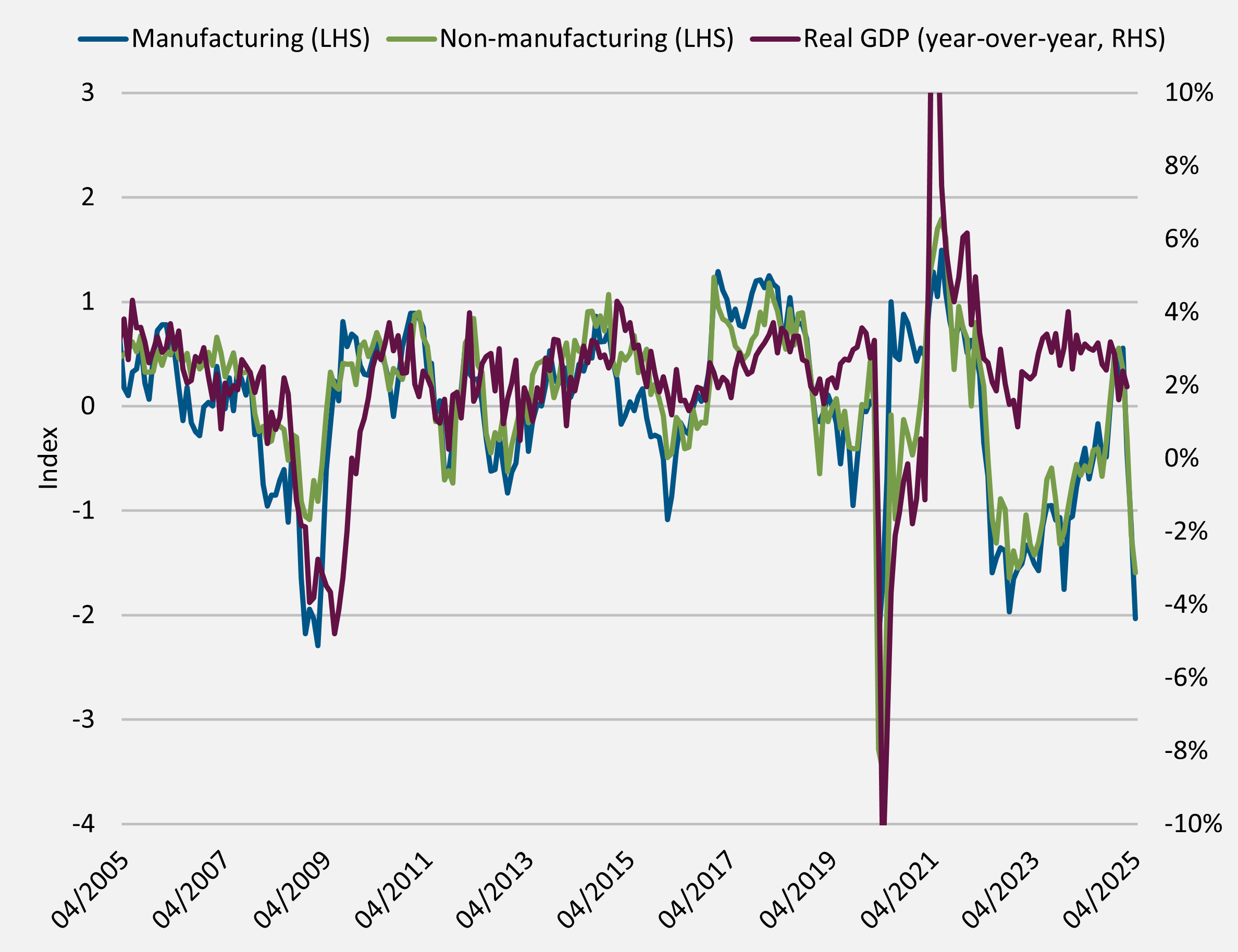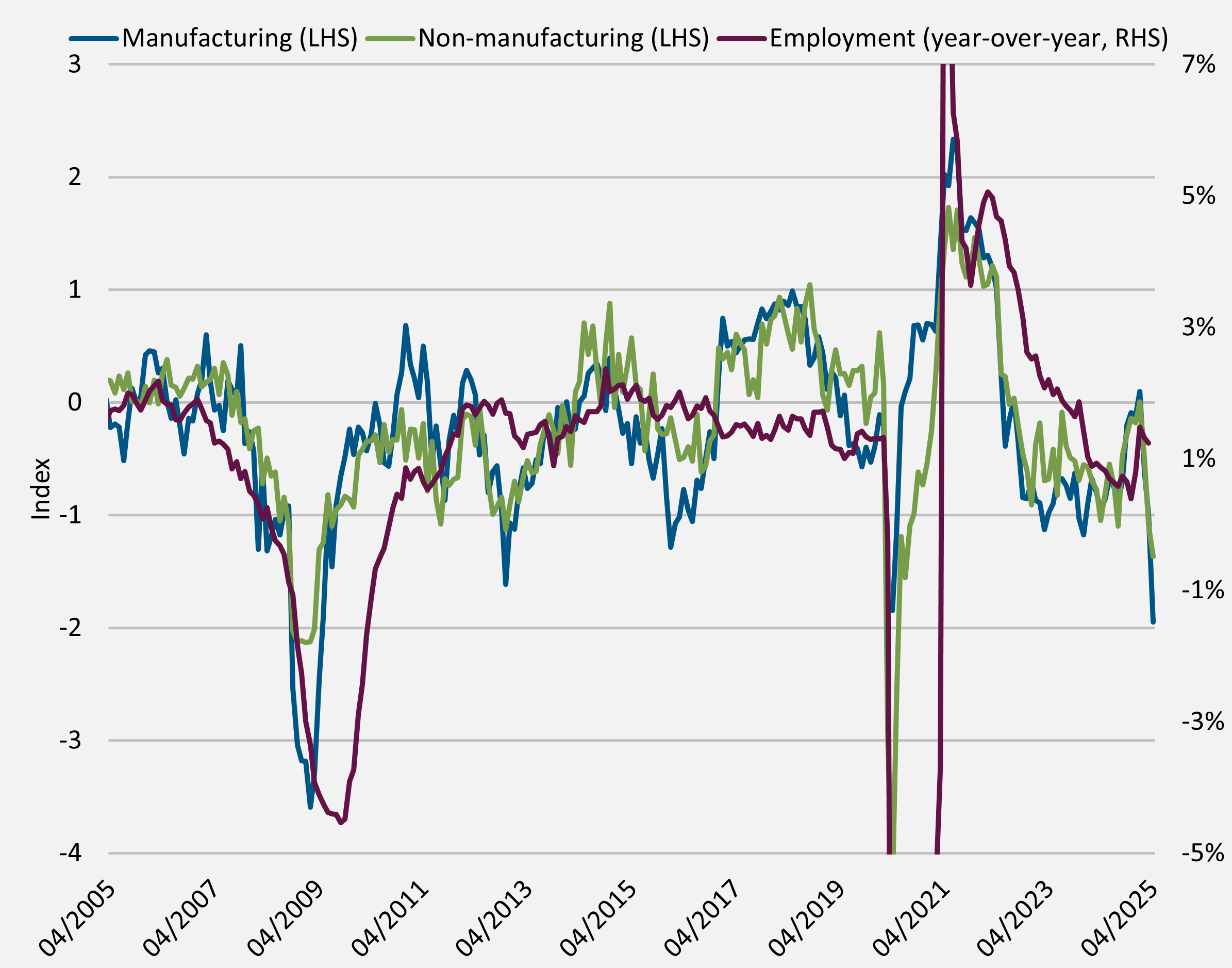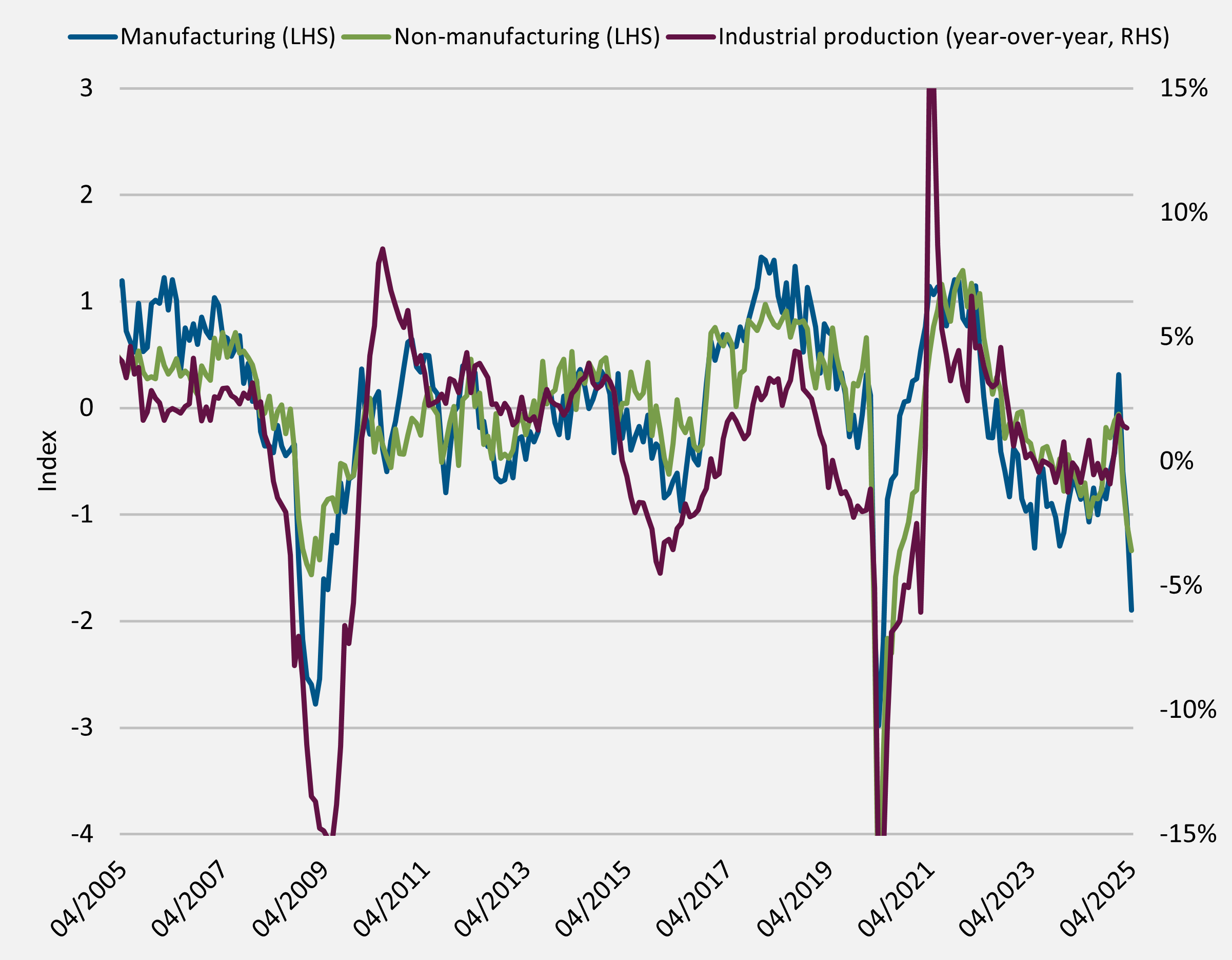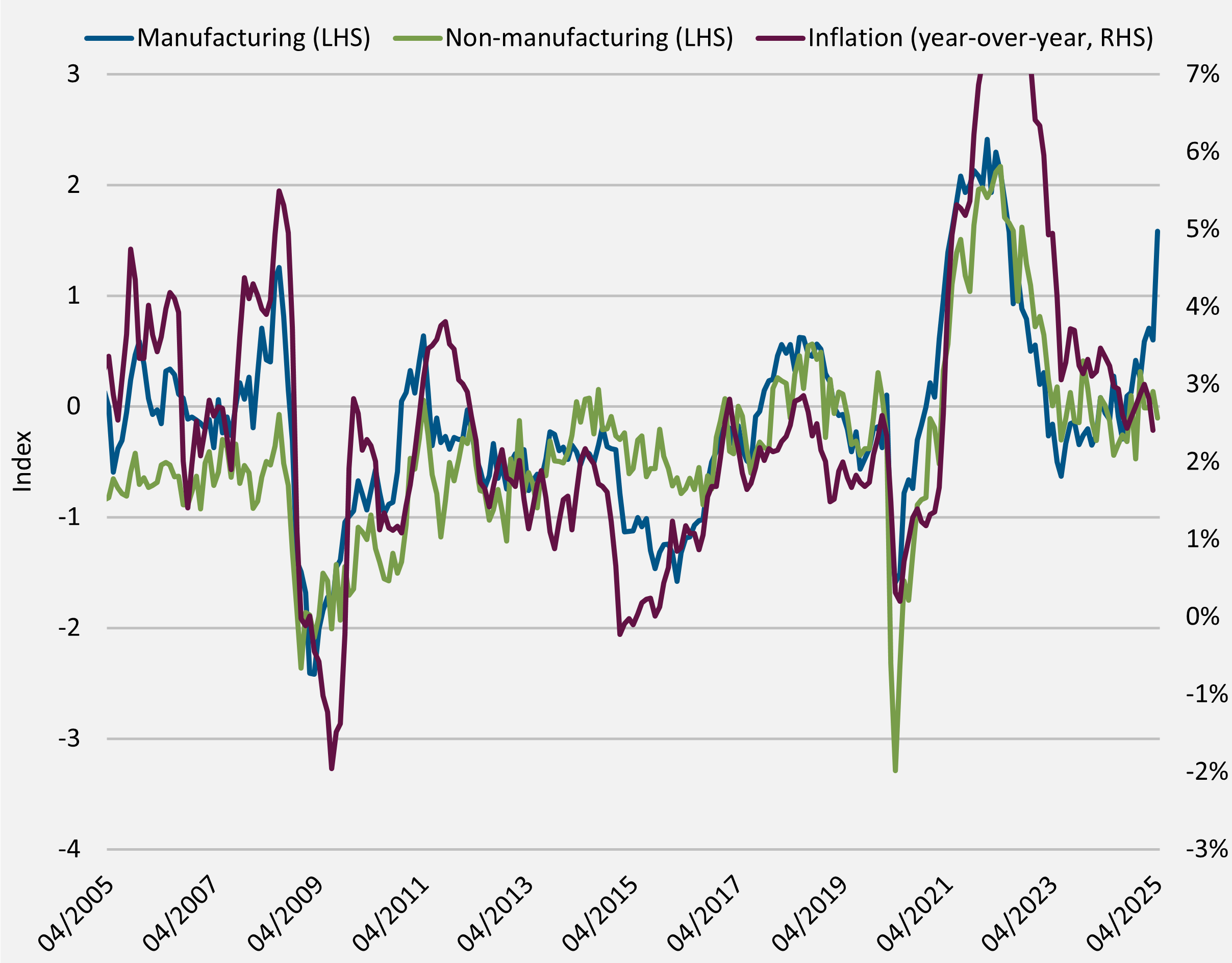Macro Signposts | 30 April 2025
A Tariff Winter Is Coming?
The adage that policy operates with lags applies to more than just central banks. Trade policy decisions and the related uncertainty they are creating will also affect the U.S. economy over different horizons, from changing secular investment decisions to more immediate effects on markets and consumer behavior.
We think the effects of trade policy changes – which have already led to a surge in imports ahead of tariffs large enough to cause U.S. real GDP to contract in the first quarter – will start to become more evident in the second half of the year and beyond.
Markets seem to reflect the potential for faster trade deals to provide relief from tariff-related challenges, with the S&P 500 (as of this writing) now down less than 2% since the Trump administration's 2 April trade announcements. However, tariff policy is already influencing business decisions today, which will likely create some cyclical disruption even if we see some de-escalation in tariff policy.
These policy-related challenges could leave many U.S. businesses facing cold choices for this year's holiday season: higher prices, lower volumes, layoffs, and slower investment.
Outlook for higher tariffs informs business decisions now
In recent notes, we've argued that the considerably amplified U.S. tariff policy has the potential to cause substantial near-term economic disruptions and possibly a U.S. recession – for details, please read our 16 April 2025 Macro Signposts. (That said, looking longer-term, greater investment in domestic industries and production could benefit the U.S. economy.)
Specifically, we've said that if maintained at current levels – or even if lowered somewhat – tariffs will likely drive a collapse in U.S. imports from China. The surge in imports in the first quarter, ahead of tariffs, will very likely give way to a collapse later this year.
Given production and delivery lead times, purchasing managers have to make ordering decisions for the second half of the year now. This means that ordering for the usual seasonal inventory restocking ahead of the holiday season is already happening under an outlook for much higher import duties. Just how much more companies must charge will depend on how quickly they can pivot to source products from manufacturers outside of China, where they could face a 10% import duty instead of the current 145% duty on the majority of Chinese imported goods.
Higher prices in turn are likely to cut volumes as consumer real incomes are squeezed. Purchasing managers need to consider this as well in their ordering decisions.
These price-related volume declines are not just a potential problem for goods-producing sectors, which import components even if they build and assemble products in the U.S. Services sectors that are built around imported goods commerce will also feel a direct impact. Trucking and shipping, sales and distribution, working capital financing, accounting, and many other business services ultimately rely on the movement and consumption of goods. Major declines in the volume of goods circulating and consumed in the U.S. economy would disrupt these industries, while the real income squeeze is also likely to affect services industries with a more general exposure to consumer discretionary spending. According to executive commentary from recent earnings calls, the leisure and travel services are already starting to feel the effects of the deterioration in consumer sentiment.
The expected volume declines will also affect staffing and investment decisions. Logistics, warehousing, wholesale, and retail categories are usually major drivers of seasonal staffing needs that could be pressured to pull back.
PMI surveys indicate a cold winter awaits
The impact of expectations on economic activity isn't just theoretical. Trade policy volatility and the outlook for higher import duties have already had a notable impact on the aggregated expectations of purchasing managers as reported in regional surveys. Indeed, these surveys reflect growing concerns that in the short run, supply chain reconfiguration won't be easy, leading to higher prices, lower sales, less hiring (or more layoffs), and lower capital expenditures. And historically, comparing changes in purchasing manager expectations to actual economic activity illustrates a clear link: Expectations strongly tend to lead economic outcomes.
In the charts below, we've averaged across the five regional Federal Reserve purchasing manager six-month-ahead expectations surveys of both manufacturing and non-manufacturing U.S. businesses. These survey responses came after the 2 April tariff announcements. We see several takeaways:
- Expectations for overall business conditions six months ahead have deteriorated dramatically (see Figure 1).
- The deterioration is evident in both manufacturing and services industries.
- Across industries, expectations for labor and investment are now at recessionary levels, and manufacturing industry expectations have fallen even more dramatically (see Figures 2 and 3).
- In contrast to services industries, manufacturers expect to see higher prices received, implying expectations for margin compression among service firms and an inability to fully pass on these higher costs to consumers (see Figure 4).
- These themes and survey results are broad-based across the five U.S. geographic regions.
Bottom line
Given average industry lead times of one to three quarters on goods ordering, companies are being forced to decide now what products and how much to order for the second half of the year and the crucial holiday shopping season. Whether tariffs remain as currently implemented or are even dialed back, goods orders must factor in expectations of lower seasonal volumes at the new higher prices that must be charged. Lower volumes are likely to coincide with lower staffing needs, even outright layoffs, and ultimately less investment. At least that is what purchasing managers are telling us in their latest surveys.
In other words, unless trade agreements that ease the impact of tariffs can be reached relatively soon and provide purchasing managers with more clarity, a cold holiday season could await. Once ordering based on expectations for higher tariffs is complete, some near-term disruption seems inevitable.
In terms of investment implications, with U.S. equity valuations still elevated despite growing risks to the economy, bonds offer the potential for stable and attractive return opportunities – a way for investors to keep warm amid cold near-term realities of the administration's efforts to reorient global supply chains.
All data in the charts below are drawn from April 2025 regional Fed surveys of manufacturing and non-manufacturing businesses. Source: Federal Reserve Banks of Dallas, Kansas City, New York, Philadelphia, and Richmond; PIMCO calculations.
Figure 1: Business conditions expectations
 |
Source: Federal Reserve, PIMCO Calculations. As of April 2025
Figure 2: Employment expectations
 |
Source: Federal Reserve, PIMCO Calculations. As of April 2025
Figure 3: Capital expenditure expectations
 |
Source: Federal Reserve, PIMCO Calculations. As of April 2025
Figure 4: Prices received expectations
 |
Source: Federal Reserve, PIMCO Calculations. As of April 2025
Catch up on recent editions of Macro Signposts:
- Challenges to Fed Independence | 23 April 2025
- How Effectively Can the U.S. Economy Untether From China? | 16 April 2025
- The U.S. Economy's Trajectory Amid Higher Tariffs | 9 April 2025
- PIMCO Cyclical Outlook Key Takeaways: Seeking Stability | 1 April 2025
- Trade Policy and the U.S. Economy in 2025 | 26 March 2025
Not yet subscribed? To receive Macro Signposts each week, please sign up here. Macro Signposts highlights weekly takeaways from the data analysis conducted by our team of economists and other macro experts. For PIMCO's official views on the global economy, please visit pimco.com.
We welcome your questions about the global macro landscape. Don't hesitate to suggest themes or data for us to analyze and discuss: Please email [email protected].
For regular insights on U.S. policy via email, please sign up here to receive PIMCO Washington Watch from Libby Cantrill, head of public policy.
All investments contain risk and may lose value. Investing in the bond market is subject to risks, including market, interest rate, issuer, credit, inflation risk, and liquidity risk. The value of most bonds and bond strategies are impacted by changes in interest rates. Bonds and bond strategies with longer durations tend to be more sensitive and volatile than those with shorter durations; bond prices generally fall as interest rates rise, and low interest rate environments increase this risk. Reductions in bond counterparty capacity may contribute to decreased market liquidity and increased price volatility. Bond investments may be worth more or less than the original cost when redeemed. Equities may decline in value due to both real and perceived general market, economic and industry conditions
Statements concerning financial market trends or portfolio strategies are based on current market conditions, which will fluctuate. There is no guarantee that these investment strategies will work under all market conditions or are appropriate for all investors and each investor should evaluate their ability to invest for the long term, especially during periods of downturn in the market. Investors should consult their investment professional prior to making an investment decision. Outlook and strategies are subject to change without notice.
This material contains the current opinions of the author and such opinions are subject to change without notice. This material is distributed for informational purposes only and should not be considered as investment advice or a recommendation of any particular security, strategy or investment product. Information contained herein has been obtained from sources believed to be reliable, but not guaranteed.
PIMCO as a general matter provides services to qualified institutions, financial intermediaries and institutional investors. Individual investors should contact their own financial professional to determine the most appropriate investment options for their financial situation. This is not an offer to any person in any jurisdiction where unlawful or unauthorized. | Pacific Investment Management Company LLC, 650 Newport Center Drive, Newport Beach, CA 92660 is regulated by the United States Securities and Exchange Commission. | PIMCO Europe Ltd (Company No. 2604517, 11 Baker Street, London W1U 3AH, United Kingdom) is authorised and regulated by the Financial Conduct Authority (FCA) (12 Endeavour Square, London E20 1JN) in the UK. The services provided by PIMCO Europe Ltd are not available to retail investors, who should not rely on this communication but contact their financial adviser. Since PIMCO Europe Ltd services and products are provided exclusively to professional clients, the appropriateness of such is always affirmed. PIMCO Europe GmbH (Company No. 192083, Seidlstr. 24-24a, 80335 Munich, Germany), PIMCO Europe GmbH Italian Branch (Company No. 10005170963, via Turati nn. 25/27 (angolo via Cavalieri n. 4) 20121 Milano, Italy), PIMCO Europe GmbH Irish Branch (Company No. 909462, 57B Harcourt Street Dublin D02 F721, Ireland), PIMCO Europe GmbH UK Branch (Company No. FC037712, 11 Baker Street, London W1U 3AH, UK), PIMCO Europe GmbH Spanish Branch (N.I.F. W2765338E, Paseo de la Castellana 43, Oficina 05-111, 28046 Madrid, Spain), PIMCO Europe GmbH French Branch (Company No. 918745621 R.C.S. Paris, 50–52 Boulevard Haussmann, 75009 Paris, France) and PIMCO Europe GmbH (DIFC Branch) (Company No. 9613, Unit GD-GB-00-BC-05-0, Level 15, Gate Building, Dubai International Financial Centre, United Arab Emirates) are authorised and regulated by the German Federal Financial Supervisory Authority (BaFin) (Marie- Curie-Str. 24-28, 60439 Frankfurt am Main) in Germany in accordance with Section 15 of the German Securities Institutions Act (WpIG). The Italian Branch, Irish Branch, UK Branch, Spanish Branch and French Branch are additionally supervised by: (1) Italian Branch: the Commissione Nazionale per le Società e la Borsa (CONSOB) (Giovanni Battista Martini, 3 - 00198 Rome) in accordance with Article 27 of the Italian Consolidated Financial Act; (2) Irish Branch: the Central Bank of Ireland (New Wapping Street, North Wall Quay, Dublin 1 D01 F7X3) in accordance with Regulation 43 of the European Union (Markets in Financial Instruments) Regulations 2017, as amended; (3) UK Branch: the Financial Conduct Authority (FCA) (12 Endeavour Square, London E20 1JN); (4) Spanish Branch: the Comisión Nacional del Mercado de Valores (CNMV) (Edison, 4, 28006 Madrid) in accordance with obligations stipulated in articles 168 and 203 to 224, as well as obligations contained in Tile V, Section I of the Law on the Securities Market (LSM) and in articles 111, 114 and 117 of Royal Decree 217/2008, respectively, (5) French Branch: ACPR/Banque de France (4 Place de Budapest, CS 92459, 75436 Paris Cedex 09) in accordance with Art. 35 of Directive 2014/65/EU on markets in financial instruments and under the surveillance of ACPR and AMF, and DIFC Branch: Regulated by the Dubai Financial Services Authority ("DFSA") (Level 13, West Wing, The Gate, DIFC) in accordance with Art. 48 of the Regulatory Law 2004. The services provided by PIMCO Europe GmbH are available only to professional clients as defined in Section 67 para. 2 German Securities Trading Act (WpHG). They are not available to individual investors, who should not rely on this communication. According to Art. 56 of Regulation (EU) 565/2017, an investment company is entitled to assume that professional clients possess the necessary knowledge and experience to understand the risks associated with the relevant investment services or transactions. Since PIMCO Europe GMBH services and products are provided exclusively to professional clients, the appropriateness of such is always affirmed. PIMCO (Schweiz) GmbH (registered in Switzerland, Company No. CH-020.4.038.582-2, Brandschenkestrasse 41 Zurich 8002, Switzerland). According to the Swiss Collective Investment Schemes Act of 23 June 2006 ("CISA"), an investment company is entitled to assume that professional clients possess the necessary knowledge and experience to understand the risks associated with the relevant investment services or transactions. Since PIMCO (Schweiz) GmbH services and products are provided exclusively to professional clients, the appropriateness of such is always affirmed. The services provided by PIMCO (Schweiz) GmbH are not available to retail investors, who should not rely on this communication but contact their financial adviser. PIMCO Asia Pte Ltd (8 Marina View, #30-01, Asia Square Tower 1, Singapore 018960, Registration No. 199804652K) is regulated by the Monetary Authority of Singapore as a holder of a capital markets services licence and an exempt financial adviser. The asset management services and investment products are not available to persons where provision of such services and products is unauthorised. | PIMCO Asia Limited (Suite 2201, 22nd Floor, Two International Finance Centre, No. 8 Finance Street, Central, Hong Kong) is licensed by the Securities and Futures Commission for Types 1, 4 and 9 regulated activities under the Securities and Futures Ordinance. PIMCO Asia Limited is registered as a cross-border discretionary investment manager with the Financial Supervisory Commission of Korea (Registration No. 08-02-307). The asset management services and investment products are not available to persons where provision of such services and products is unauthorised. | PIMCO Investment Management (Shanghai) Limited. Office address: Suite 7204, Shanghai Tower, 479 Lujiazui Ring Road, Pudong, Shanghai 200120, China (Unified social credit code: 91310115MA1K41MU72) is registered with Asset Management Association of China as Private Fund Manager (Registration No. P1071502, Type: Other). | PIMCO Australia Pty Ltd ABN 54 084 280 508, AFSL 246862. This publication has been prepared without taking into account the objectives, financial situation or needs of investors. Before making an investment decision, investors should obtain professional advice and consider whether the information contained herein is appropriate having regard to their objectives, financial situation and needs. To the extent it involves Pacific Investment Management Co LLC (PIMCO LLC) providing financial services to wholesale clients, PIMCO LLC is exempt from the requirement to hold an Australian financial services licence in respect of financial services provided to wholesale clients in Australia. PIMCO LLC is regulated by the Securities and Exchange Commission under US laws, which differ from Australian laws. | PIMCO Japan Ltd, Financial Instruments Business Registration Number is Director of Kanto Local Finance Bureau (Financial Instruments Firm) No. 382. PIMCO Japan Ltd is a member of Japan Investment Advisers Association, The Investment Trusts Association, Japan and Type II Financial Instruments Firms Association. All investments contain risk. There is no guarantee that the principal amount of the investment will be preserved, or that a certain return will be realized; the investment could suffer a loss. All profits and losses incur to the investor. The amounts, maximum amounts and calculation methodologies of each type of fee and expense and their total amounts will vary depending on the investment strategy, the status of investment performance, period of management and outstanding balance of assets and thus such fees and expenses cannot be set forth herein. | PIMCO Taiwan Limited is an independently operated and managed company. The reference number of business license of the company approved by the competent authority is (112) Jin Guan Tou Gu Xin Zi No. 015. The registered address of the company is 40F., No.68, Sec. 5, Zhongxiao East Rd., Xinyi District, Taipei City 110, Taiwan (R.O.C.), and the telephone number is +886 2 8729-5500. | PIMCO Canada Corp. (199 Bay Street, Suite 2050, Commerce Court Station, P.O. Box 363, Toronto, ON, M5L 1G2) services and products may only be available in certain provinces or territories of Canada and only through dealers authorized for that purpose. | Note to Readers in Colombia: This document is provided through the representative office of Pacific Investment Management Company LLC located at Carrera 7 No. 71-52 TB Piso 9, Bogota D.C. (Promoción y oferta de los negocios y servicios del mercado de valores por parte de Pacific Investment Management Company LLC, representada en Colombia.). Note to Readers in Brazil: PIMCO Latin America Administradora de Carteiras Ltda.Av. Brg. Faria Lima, 3477 Itaim Bibi, São Paulo - SP 04538-132 Brazil. Note to Readers in Argentina: This document may be provided through the representative office of PIMCO Global Advisors LLC AVENIDA CORRIENTES, 299, Buenos Aires, Argentina. | No part of this publication may be reproduced in any form, or referred to in any other publication, without express written permission. PIMCO is a trademark of Allianz Asset Management of America LLC in the United States and throughout the world. ©2025, PIMCO.
CMR2025-0430-4456913